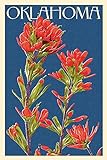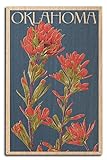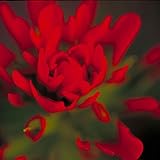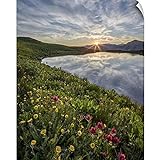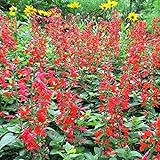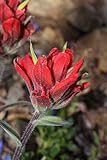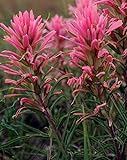Reviews Indian Paintbrush Oklahoma
Oklahoma, Indian Paintbrush, Letterpress (9x12 Art Print, Wall Decor Travel Poster)
- Oklahoma, Indian Paintbrush, Letterpress (9x12 Art Print, Wall Decor Travel Poster), Image size of 7.75 x 11.625 inches, white borders along all edges of at least 0.25 inches..
- Guaranteed color accuracy, durable imaging, and high print resolution..
- Printed on heavy stock paper using a high-end digital printing press..
- Lantern Press high-quality art prints are designed and printed in the USA..
Check StockOklahoma, Indian Paintbrush, Letterpress Birch Wood Wall Sign (10x15 Rustic Home Decor, Ready to Hang Art)
- Oklahoma, Indian Paintbrush, Letterpress Birch Wood Wall Sign (10x15 Rustic Home Decor, Ready to Hang Art), sustainable wood sign printed in the USA..
- Sign measures 10 x 15 inches and 1/8 inches thick..
- Printed with Greenguard Gold Certified eco-friendly inks in the USA..
- Hole in each corner, decor sign is ready to hang in your home..
Check StockWonder and Wildflowers: A Beautiful New Perspective Towards Life
- GROW:Seed Indian paintbrush in early spring or late summer in full sun and well-drained soil that's between 55 and 65 degrees Fahrenheit. Be patient.
- the seeds may take a few months to germinate..
- USE:The flowers of Indian paintbrush are edible, and were consumed in moderation by various Native American tribes as a condiment with other fresh greens..
- EXTERIOR:Indian paintbrush flowers are named for the clusters of spiky blooms that resemble paintbrushes dipped in bright red or orange-yellow paint. Growing this wildflower can add interest to the native garden..
- NOTE:Indian paintbrushes are partial root parasites, attaching their roots to the roots of nearby plants and tapping their nutrients. Most commonly parasitized are little bluestem, penstemons, and prairie blue-eyed grass..
Check StockIndian Paintbrush Seed Balls for Seed Bombing (Castilleja coccinea) (50)
- GROW:Seed Indian paintbrush in early spring or late summer in full sun and well-drained soil that's between 55 and 65 degrees Fahrenheit. Be patient.
- the seeds may take a few months to germinate..
- USE:The flowers of Indian paintbrush are edible, and were consumed in moderation by various Native American tribes as a condiment with other fresh greens..
- EXTERIOR:Indian paintbrush flowers are named for the clusters of spiky blooms that resemble paintbrushes dipped in bright red or orange-yellow paint. Growing this wildflower can add interest to the native garden..
- NOTE:Indian paintbrushes are partial root parasites, attaching their roots to the roots of nearby plants and tapping their nutrients. Most commonly parasitized are little bluestem, penstemons, and prairie blue-eyed grass..
Check StockLa Leyenda del Pincel Indio: The Legend of the Indian Paintbrush (Paperstar) (Spanish Edition)
- GROW:Seed Indian paintbrush in early spring or late summer in full sun and well-drained soil that's between 55 and 65 degrees Fahrenheit. Be patient.
- the seeds may take a few months to germinate..
- USE:The flowers of Indian paintbrush are edible, and were consumed in moderation by various Native American tribes as a condiment with other fresh greens..
- EXTERIOR:Indian paintbrush flowers are named for the clusters of spiky blooms that resemble paintbrushes dipped in bright red or orange-yellow paint. Growing this wildflower can add interest to the native garden..
- NOTE:Indian paintbrushes are partial root parasites, attaching their roots to the roots of nearby plants and tapping their nutrients. Most commonly parasitized are little bluestem, penstemons, and prairie blue-eyed grass..
Check StockCANVAS ON DEMAND Split-Leaf Indian Paintbrush and Alpine Wall Decal, Colorado Artwork
- GROW:Seed Indian paintbrush in early spring or late summer in full sun and well-drained soil that's between 55 and 65 degrees Fahrenheit. Be patient.
- the seeds may take a few months to germinate..
- USE:The flowers of Indian paintbrush are edible, and were consumed in moderation by various Native American tribes as a condiment with other fresh greens..
- EXTERIOR:Indian paintbrush flowers are named for the clusters of spiky blooms that resemble paintbrushes dipped in bright red or orange-yellow paint. Growing this wildflower can add interest to the native garden..
- NOTE:Indian paintbrushes are partial root parasites, attaching their roots to the roots of nearby plants and tapping their nutrients. Most commonly parasitized are little bluestem, penstemons, and prairie blue-eyed grass..
Check StockDavid's Garden Seeds Flower Native Texas Sage Scarlet 3244 (Red) 200 Non-GMO, Heirloom Seeds
- GROW:Seed Indian paintbrush in early spring or late summer in full sun and well-drained soil that's between 55 and 65 degrees Fahrenheit. Be patient.
- the seeds may take a few months to germinate..
- USE:The flowers of Indian paintbrush are edible, and were consumed in moderation by various Native American tribes as a condiment with other fresh greens..
- EXTERIOR:Indian paintbrush flowers are named for the clusters of spiky blooms that resemble paintbrushes dipped in bright red or orange-yellow paint. Growing this wildflower can add interest to the native garden..
- NOTE:Indian paintbrushes are partial root parasites, attaching their roots to the roots of nearby plants and tapping their nutrients. Most commonly parasitized are little bluestem, penstemons, and prairie blue-eyed grass..
Check Stock50 INDIAN PAINTBRUSH Castilleja Indivisa Flower Seeds
- Appearance. The bright red leaf-like bracts surrounding the white to greenish flowers make the plant look like a brush dipped in red paint. They sometimes produce a light yellow or pure white variation mixed in with the reds..
- Height. Each plant typically grows 30–45 cm (12–18 in) in height. The leaves are long and stalkless. USDA Hardiness Zone: 3 - 9..
- Germination. Seed Indian paintbrush in early spring or late summer in full sun and well-drained soil that's between 55 and 65 degrees Fahrenheit. Be patient.
- the seeds may take a few months to germinate..
- Benefit. The paintbrush was macerated in grease by the Indians and used as hair oil to invigorate the hair and make it glossy..
- Edible. The flowers of the Indian paintbrush are edible and were consumed in moderation by various Native American tribes as a condiment with other fresh greens..
Check StockCastilleja sessiliflora | Downy Indian Paintbrush | Painted Cup | 200_Seeds
- Appearance. The bright red leaf-like bracts surrounding the white to greenish flowers make the plant look like a brush dipped in red paint. They sometimes produce a light yellow or pure white variation mixed in with the reds..
- Height. Each plant typically grows 30–45 cm (12–18 in) in height. The leaves are long and stalkless. USDA Hardiness Zone: 3 - 9..
- Germination. Seed Indian paintbrush in early spring or late summer in full sun and well-drained soil that's between 55 and 65 degrees Fahrenheit. Be patient.
- the seeds may take a few months to germinate..
- Benefit. The paintbrush was macerated in grease by the Indians and used as hair oil to invigorate the hair and make it glossy..
- Edible. The flowers of the Indian paintbrush are edible and were consumed in moderation by various Native American tribes as a condiment with other fresh greens..
Check Stock500 Castilleja Exserta Seeds |Pink Indian Paintbrush Flower | Purple Owls Clover Seeds
- Appearance. The bright red leaf-like bracts surrounding the white to greenish flowers make the plant look like a brush dipped in red paint. They sometimes produce a light yellow or pure white variation mixed in with the reds..
- Height. Each plant typically grows 30–45 cm (12–18 in) in height. The leaves are long and stalkless. USDA Hardiness Zone: 3 - 9..
- Germination. Seed Indian paintbrush in early spring or late summer in full sun and well-drained soil that's between 55 and 65 degrees Fahrenheit. Be patient.
- the seeds may take a few months to germinate..
- Benefit. The paintbrush was macerated in grease by the Indians and used as hair oil to invigorate the hair and make it glossy..
- Edible. The flowers of the Indian paintbrush are edible and were consumed in moderation by various Native American tribes as a condiment with other fresh greens..
Check Stock


